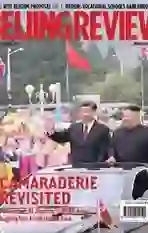A Stronger WTO
2019-07-09ByWangPeng
By Wang Peng
China submitted a new proposal on reform to the World Trade Organization(WTO) in May, where it argued that“unilateralism and the abuse of national security exemptions” have damaged the“rules-based international trade order.” It called for limiting the use of national security exemptions and unilateral measures as well as resolving disputes surrounding the WTOs Appellate Body.
The international community regarded Chinas proposal with great interest, not only because opposing priorities among WTO members may make any reform process a prolonged and diffi cult one, but also because many countries may want to focus on resolving disagreements regarding the appellate body to prevent it from grinding to a halt later this year.
What makes the situation even more serious is that the U.S. regards the WTO as a new platform for great power rivalry. Highranking U.S. offi cials have accused China of wrongdoing by inventing the theory of “three nos”: one, China is a non-market economy country, denying Chinas market-economy status; two, Chinas economic system is incompatible with the WTO; and three, China is no longer a developing country and therefore not entitled to special or differential WTO treatment.
In other words, the Donald Trump administration is trying to use the WTO as a battlefi eld against China, and hence, this attempt will push reform toward a dead end.
The U.S. has been blocking appoint- ments to the appellate body for years over claims that the body has overstepped its bounds by establishing new commitments for WTO members that had not been agreed upon, among other things. The full appellate body has seven members, but its current membership is down to three, the minimum required to rule on cases, and will fall below that number before the end of the year.
WTO reform may change the future world economy map because this process will set the rules of the game for global trade and investment for about the next quarter century. Therefore, it is widely believed that current heated and ongoing trade negotiations like the ones between China and the U.S., Japan and the U.S., and the European Union (EU) and the U.S. are just a prologue to the ultimate “big show” of WTO reform. Actually, the “game of thrones” surrounding WTO reform started several years ago. Now its just a matter of time before formal negotiations begin, likely following the successful completion of various separate negotiations involving ongoing trade spats. This series of negotiations may further pave the way for WTO reform by securing broad-based consensus among related stakeholders on matters of concern.
